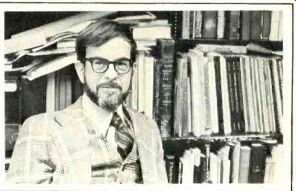By James Goodfriend
CLOSING THE COPYRIGHT OFFICE
IDEAS don't occur to just one person. Not 1 more than a few weeks ago I was telling almost anybody who would listen that the real problem with writing music today is that it has all been written already. More recently, conductor Klaus Tennstedt was quoted to the effect that, at least so far as music for conventional instruments is concerned, it has all already been composed. I wonder how many others have been espousing the same thought.

Such ideas are brought on by a combination of experience, intuition, and disillusionment. There are more composers today than at any time in the history of the world, an insanely odd situation when one realizes that there is probably less public demand for their services than at any previous time.
Composers, having learned to write music, write music, and many of them write a good deal of it. To music-loving people who are not composers, most of this music seems to elicit one of two reactions: (1) I've heard it before, or (2) I haven't heard it before and I don't want to hear it again.
Such experience leads one to intuit two things: first, though all the nearly infinite possible combinations of tones have not been used up, many of them have (I've heard it before); and second, of the vast range of tonal possibilities that exist, some, maybe most, are not as good as some others (I never want to hear it again). The disillusionment sets in, then, because most of the new music is either derivative or ugly.
Now, any composer (or aficionado) of new music who has followed my train of thought this far has a perfect right to be incensed; the case is overstated. The truth of the matter is not that all music has been written already, or even that all good music has been written already, but that most of it has. Given the Western musical language from plainchant through, let's say, Stravinsky, Schoenberg, Bartok, Webern, and Ives, and all the "dialects" encompassed therein, there is a shrinking, if indeterminable, number of pieces that can still be com posed without sounding too much like other pieces that have already been composed.
How much is too much? That seems to depend on the particular musical dialect involved, on the richness of its possibilities.
I am not among those who feel that the Western tonal system with its complex interrelationships of keys and harmonic areas is the God-given norm of music and that music composed on any other basis is doomed to failure. But there is no question that this tonal language (or "dialect") had potentialities for the expression of different moods, feelings, and personalities unmatched by any prior or any subsequent musical dialect. No one mistakes Haydn for Grieg and no one denies the necessity of the Beethoven Fifth because we have the Beethoven Third. But most composers today would agree that that musical dialect is used up; anything written in it now would be not only anachronistic and derivative but superfluous (in spite of this, some composers try). Other musical dialects--dodeca phony, modality, the "poly-"s, free atonality, dissonant counterpoint, et al.--have not proved to have that degree of richness.
Which means that pieces written in these dialects are even more likely to sound secondhand than the last-gasp tonal pieces.
There still are pieces to be written in these dialects--one comes along every once in a while--but composers are filling up vacant lots here, not staking out new territory.
Of course, one can find new territory, create a new dialect, turn one's back on the vocabulary of the past, and that is where all this "I haven't heard it before but I don't want to hear it again" music comes in. For, although there are occasional pieces of power and interest, the new vocabularies are based largely on what great composers chose to leave out of the old. All possibilities are not equally valid (and certainly not equally beautiful) to our ears. One can also combine vocabularies, mixing the old and the new. Again, certain good pieces come out of this, but isn't the very attempt a confession that all other possibilities are closing down past? Perhaps the worst of this situation is that the pressure on composers to write what they do is largely self-applied. The public expresses little desire or need for new music.
I wonder sometimes just where composers today get the confidence to compose; for most of them it's not even a good living.
Also see:
Link | --PIONEER--WE BRING IT BACK ALIVE
Editorially Speaking [May 1978]
Link | --Classical music
Source: Stereo Review (USA magazine)